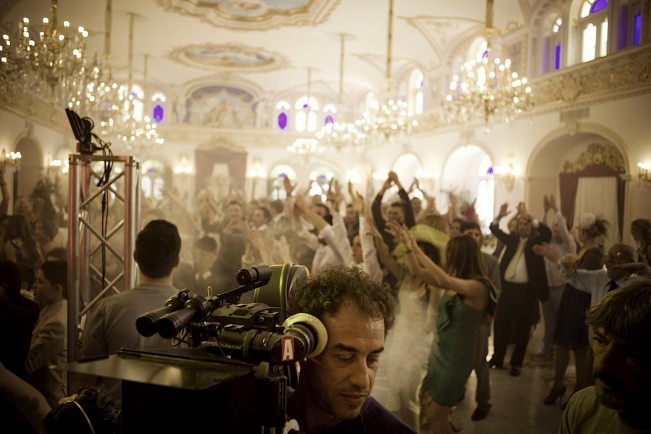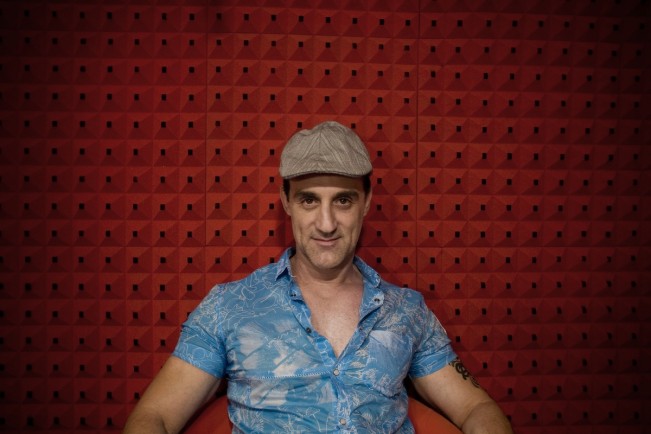By Jake Howell jake.howell@utoronto.ca
Cannes Competition review: Reality
Matteo Garrone’s Reality feels like the spiritual successor to (and a modernization of) Luchino Visconti’s 1951 Neorealist classic Bellissima, but it also holds the power to stand by itself: both as an excellent character study, and a dark satire of the entertainment industry.
 The most unnerving thing about reality television is its uncanny ability to lure audiences into a seductive fantasy world, and that’s exactly what happens to Reality’s Luciano (played by the previously unknown Aniello Arena). After unexpectedly auditioning for Italian Big Brother spin-off Grande Fratello, Luciano gets a callback to be a star on the program’s latest season.
The most unnerving thing about reality television is its uncanny ability to lure audiences into a seductive fantasy world, and that’s exactly what happens to Reality’s Luciano (played by the previously unknown Aniello Arena). After unexpectedly auditioning for Italian Big Brother spin-off Grande Fratello, Luciano gets a callback to be a star on the program’s latest season.
From here, it becomes clear that joining the cast of Grande Fratello is like winning the lottery, as the show’s grand prize pays out hundreds of thousands of Euros. Thus, Luciano and his family are justifiably excited by the second audition, despite the judgments one might make about reality television as a horrible behemoth industry. Money and fame are attractive promises, and it’s fair to assume most people would be excited by Luciano’s potential success. In other words, this story could (and presumably does) happen, which is sad.
The desperation to escape poverty is a prevalent theme in Bellissima, and while Luciano’s family isn’t exactly grasping at straws for cash, his obsessive drive to join the cast of Grande Fratello is similar to what we see in Visconti’s film. The “what-if” fantasy of being chosen takes hold of Luciano’s reality, and negatively distracts him from being the loyal father he usually is. He makes rash decisions – as well as foolish ones – and the people that love him watch him fall deeper into madness.
There are several comparisons to be made between Reality and Bellissima – they both heavily involve Cinecitta Studios, for example – but it feels somewhat unfair to pigeonhole Reality as simply a familiar recreation of Visconti. It’s not, for better or for worse. The main parallels between the old and the new are similar narratives and Neorealist construction, and the scary rabbit hole of chasing your dreams blindly.
 In keeping with the overall theme of the film, Garrone correctly employs his camera in a similar fashion to how most reality television shows are constructed, with close-up portraits and shots that follow the characters through various environments. There are also many sweeping crane shots that travel through elaborate sets that are on location, which comes across as “real” and organic. The elegance in Garrone’s direction is his ability to have a million different things happening within the frame without it feeling overwhelming – these are busy, cluttered scenes, but it still feels natural.
In keeping with the overall theme of the film, Garrone correctly employs his camera in a similar fashion to how most reality television shows are constructed, with close-up portraits and shots that follow the characters through various environments. There are also many sweeping crane shots that travel through elaborate sets that are on location, which comes across as “real” and organic. The elegance in Garrone’s direction is his ability to have a million different things happening within the frame without it feeling overwhelming – these are busy, cluttered scenes, but it still feels natural.
In terms of the acting, Reality’s troupe of non-actors prove once again that you can find talent and believable performances if the director in charge is any good. Thanks to Garrone, no one in this film rings false – not even Aniello Arena, who was released from jail to film Reality with Garrone. In fact, Arena’s very real jail-time (for murder, by the way) makes this film all the more interesting. Consider the fact that with Reality, we have a person hitting the jackpot: Arena has left prison to film a fictional movie – how lucky is that? – about a television series that is essentially a glorified prison with cameras trained on its inmates. The real world connections in this film are kind of incredible.
And therein lies the central irony of Garrone’s latest film; a piece that constantly plays with what is real and what is fantasy. There’s irony in a realistic film about fantasy, and there’s fantasy in watching a fictional film about reality television. It’s enough to make your head spin, so I humbly offer the job of properly dissecting the film to someone like Peter Bondanella, an expert on Italian cinema. Academic scholars will likely have a field day with the interesting binaries Garrone is broaching here, and I can’t wait to read their take on it. Reality is a brilliant film.
















To Mr. Jake Howell:
I’m enjoying your reviews from Cannes, though I’ve noticed that you (like a lot of people) tend to misuse the word “hopefully”. It is an adverb meaning “in a hopeful frame of mind”, e.g. “He submitted his film hopefully (i.e., hopeful that it would be accepted)” or “Having heard the film was good, we entered the auditorium hopefully”. Certain permissive dictionaries will allow for the informal (actually erroneous) use (e.g., Hopefully the film will attract audiences), but, to reiterate, this is really a mis-use.
Hi Thom,
thanks for the reminder. I’ve gone ahead and changed the sentence in question, and I appreciate the feedback.
Associated Press recently added the “informal” version to its permitted usage.